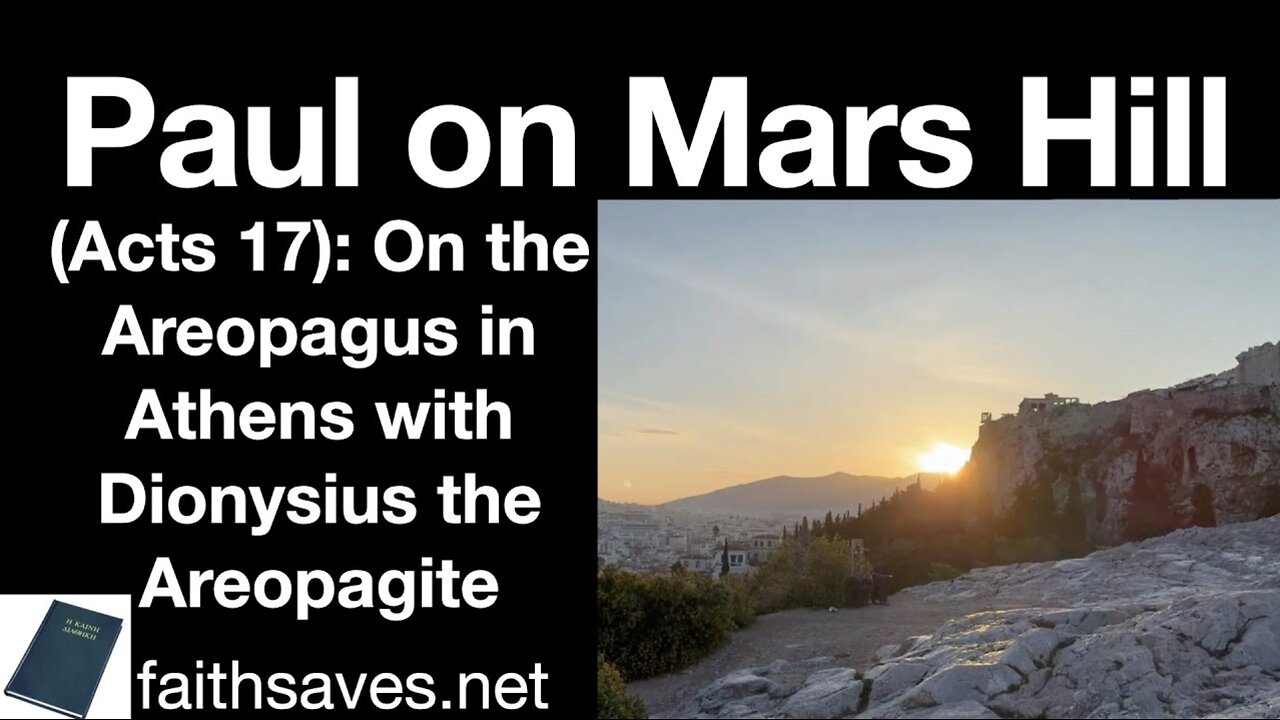Premium Only Content

Agora to the Areopagus: the Apostle Paul on Mars Hill in Athens & Dionysius the Areopagite (Acts 17)
Acts 17 records the visit of the Apostle Paul to the capital of Greece, Athens, and his evangelistic activity in the agora or marketplace, from whence he was invited by Stoic and Epicurean philosophers from near Zeno's stoa to Mars Hill, or Areopagus, a site close to the Parthenon on the Athenian acropolis, where the temple of Athena Nike or Diana was located. God used Paul's sermon to bring a leading Greek official, Dionysius the Areopagite, to faith in Jesus Christ, along with a woman named Damaris and a variety of others-the nucleus of the first Christian church in the city of Athens.
Acts 17 explains:
16 Now while Paul waited for them at Athens, his spirit was stirred in him, when he saw the city wholly given to idolatry. 17 Therefore disputed he in the synagogue with the Jews, and with the devout persons, and in the market daily with them that met with him. 18 Then certain philosophers of the Epicureans, and of the Stoicks, encountered him. And some said, What will this babbler say? other some, He seemeth to be a setter forth of strange gods: because he preached unto them Jesus, and the resurrection. 19 And they took him, and brought him unto Areopagus, saying, May we know what this new doctrine, whereof thou speakest, is? 20 For thou bringest certain strange things to our ears: we would know therefore what these things mean. 21 (For all the Athenians and strangers which were there spent their time in nothing else, but either to tell, or to hear some new thing.) 22 Then Paul stood in the midst of Mars’ hill, and said, Ye men of Athens, I perceive that in all things ye are too superstitious. 23 For as I passed by, and beheld your devotions, I found an altar with this inscription, TO THE UNKNOWN GOD. Whom therefore ye ignorantly worship, him declare I unto you. 24 God that made the world and all things therein, seeing that he is Lord of heaven and earth, dwelleth not in temples made with hands; 25 Neither is worshipped with men’s hands, as though he needed any thing, seeing he giveth to all life, and breath, and all things; 26 And hath made of one blood all nations of men for to dwell on all the face of the earth, and hath determined the times before appointed, and the bounds of their habitation; 27 That they should seek the Lord, if haply they might feel after him, and find him, though he be not far from every one of us: 28 For in him we live, and move, and have our being; as certain also of your own poets have said, For we are also his offspring. 29 Forasmuch then as we are the offspring of God, we ought not to think that the Godhead is like unto gold, or silver, or stone, graven by art and man’s device. 30 And the times of this ignorance God winked at; but now commandeth all men every where to repent: 31 Because he hath appointed a day, in the which he will judge the world in righteousness by that man whom he hath ordained; whereof he hath given assurance unto all men, in that he hath raised him from the dead. 32 And when they heard of the resurrection of the dead, some mocked: and others said, We will hear thee again of this matter. 33 So Paul departed from among them. 34 Howbeit certain men clave unto him, and believed: among the which was Dionysius the Areopagite, and a woman named Damaris, and others with them.
In Acts 17:28 Paul makes two references to pagan Greek writings. Compare Acts 17:28a, "in him we live, and move, and have our being” with Epimenides: “O holy and high one … thou livest and abidest for ever, for in thee we live and move and have our being.” Diogenes Laertius, in his Lives of Eminent Philosophers, states that Epimenides delivered Athens from the plague through actions on the Aeropagus (Diogenes Laertius, Lives of Eminent Philosophers, ed. R. D. Hicks [Kansas City Missouri: Harvard University Press, November 1, 2005], 115). Paul's reference to Epimenides was, therefore, most appropriate.
Compare Acts 17:28b, “For we are also his offspring," with: “[His] godhead fills all streets, all thronging marts of men, the boundless sea and all its ports: whose aid all mortals need; for we his offspring are.” (Aratus)
Who was Dionysius the Areopagite? The Christian historian Eusebius, in his Ecclesiastical History, declares: "Dionysius the Areopagite was converted by the Apostle Paul to the faith … and was the first to be appointed to the bishopric of the diocese of Athens.” (Eusebius, Ecclesiastical History 4.23.3). Craig Keener explains: "As a member of the town’s highest aristocratic court, Dionysius ‘the Areopagite’ was undoubtedly a municipal decurion, one of the highest-status converts so far mentioned [in Acts]” (Keener, Acts, 2678).
Sources referenced: Eusebius of Caesarea, Evangelicae Praeparationis Libri XV, ed. E. H. Gifford, 720; M. D. Gibson, Horae Semiticae X, 40; Aratus, Phaenomena 1; F. F. Bruce, The Book of the Acts, The New International Commentary on the New Testament, 338–339; Craig S. Keener, Acts: An Exegetical Commentary: 15:1–23:35, vol. 3, 2657–2661.
-
 1:01:50
1:01:50
Kyle Fortch
1 hour agoCallum Kerr Joins Netflix’s Biggest Shows & Signs First Record Deal | THE ONE SHEET S1E1
1 -
 LIVE
LIVE
Matt Kohrs
8 hours agoMARKETS CRASH: The DeepSeek Panic || The MK Show
1,941 watching -
 39:56
39:56
BonginoReport
2 hours agoTrump Alpha-Males Colombia (Ep.126) - 01/27/2025
18.9K58 -
 LIVE
LIVE
Jeff Ahern
1 hour agoMonday Madness with Jeff Ahern (6am Pacific)
502 watching -
 1:21:30
1:21:30
Game On!
10 hours ago $1.26 earnedPatrick Mahomes does it AGAIN!
7.83K3 -
 15:20
15:20
Misha Petrov
2 hours agoReacting To Liberal MELTDOWNS Over Trump’s Return - Gen Z Is Planning a REVOLUTION?!
14.3K16 -
 18:22
18:22
Neil McCoy-Ward
2 hours agoThe 🇨🇴 Colombian President Just Learned The HARD WAY!!! (Another Win For The USA 🇺🇸)
13.3K8 -
 1:56:04
1:56:04
TheDozenPodcast
17 hours agoMass deportations, Islamists, Saving the UK: Nick Tenconi
25K18 -
 35:24
35:24
Survive History
22 hours ago $9.10 earnedCould You Survive in a Cavalry Regiment During the English Civil War?
90.6K9 -
 28:15
28:15
Degenerate Plays
17 hours ago $4.48 earnedTwo Birds' Secret Meeting - Gotham Knights : Part 26
73.1K6